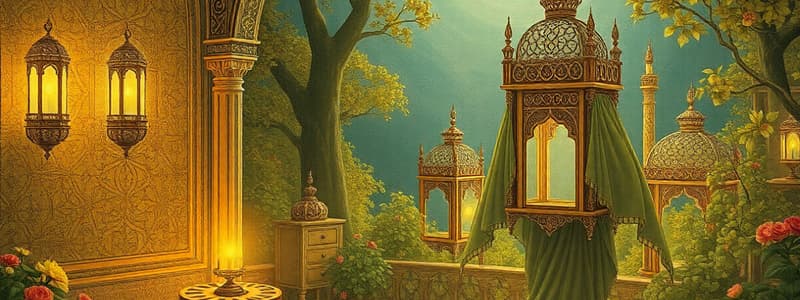Podcast
Questions and Answers
Education has been used by European colonisers to strengthen colonial grip on ______ societies.
Education has been used by European colonisers to strengthen colonial grip on ______ societies.
colonised
Edward Said calls imperialism an 'educational ______.'
Edward Said calls imperialism an 'educational ______.'
movement
Classical European colonialism involved both military and ______ control.
Classical European colonialism involved both military and ______ control.
educational
The British East India Company brought Western scholars who were divided into Anglicists and ______.
The British East India Company brought Western scholars who were divided into Anglicists and ______.
Before World War 1, English literature was regarded by university professors as suitable only for 'second and ______ rate minds.'
Before World War 1, English literature was regarded by university professors as suitable only for 'second and ______ rate minds.'
English literature was deemed to be below the level of ______ or below literary or scholarly significance.
English literature was deemed to be below the level of ______ or below literary or scholarly significance.
In 1917, University of ______ introduced English literature as a subject to their students.
In 1917, University of ______ introduced English literature as a subject to their students.
English literature was perceived to be used as a tool for spreading ideas and values for the ______ mission.
English literature was perceived to be used as a tool for spreading ideas and values for the ______ mission.
One of the greatest ironies in the history of modern learning is the fact that English literature was first introduced as a subject of study at tertiary level in ______, not in England.
One of the greatest ironies in the history of modern learning is the fact that English literature was first introduced as a subject of study at tertiary level in ______, not in England.
English literature was introduced in British India in 1835 to facilitate the ______ of colonised lands, people and resources.
English literature was introduced in British India in 1835 to facilitate the ______ of colonised lands, people and resources.
In the postcolonial world, there is a perceived urgency to reconstruct national ______.
In the postcolonial world, there is a perceived urgency to reconstruct national ______.
The teaching of English literature in the colonies was a way in which Western colonial powers asserted their cultural and moral ______.
The teaching of English literature in the colonies was a way in which Western colonial powers asserted their cultural and moral ______.
Now this new literary tradition reflects a plural Britain - it isn’t all ______ & Christians.
Now this new literary tradition reflects a plural Britain - it isn’t all ______ & Christians.
Flashcards
Imperialism as an 'educational movement'
Imperialism as an 'educational movement'
Imperialism was used as a tool to spread European ideas through education, which, in turn, allowed colonizers to control colonised societies.
Cultural Domination
Cultural Domination
The act of dominating another culture through education, which leads to the suppression of indigenous knowledge and practices.
Mental Colonization
Mental Colonization
The process of colonizing someone's mind through education, often by promoting the colonizer's culture and values.
English Literature in Colonized Countries
English Literature in Colonized Countries
Signup and view all the flashcards
Classical European Colonialism
Classical European Colonialism
Signup and view all the flashcards
English Literature's initial status in Britain
English Literature's initial status in Britain
Signup and view all the flashcards
Why was English Literature introduced in British India?
Why was English Literature introduced in British India?
Signup and view all the flashcards
Postcolonial Literature's aim
Postcolonial Literature's aim
Signup and view all the flashcards
English Literature's role in colonialism
English Literature's role in colonialism
Signup and view all the flashcards
Postcolonial literature in Britain
Postcolonial literature in Britain
Signup and view all the flashcards
Postcolonial Literature's impact on British identity
Postcolonial Literature's impact on British identity
Signup and view all the flashcards
Genres in Postcolonial Literature
Genres in Postcolonial Literature
Signup and view all the flashcards
Driving force behind postcolonial literature
Driving force behind postcolonial literature
Signup and view all the flashcards
Study Notes
Introduction to English Studies in Muslim Societies (ENGL 1310)
- Course overview includes topics like Literature & Islam, History of English Literature, reasons for introduction into British India, Postcolonial literature, birth of Muslim writings, and homework assignments.
Overview
- Topics include:
- Literature & Islam
- History of English Literature
- Reasons for introducing English Literature in British India
- Postcolonial literature
- Birth of Muslim writings
- Homework
What's the Difference Between Literature & Islam?
- Literature and Islam are distinct but interconnected entities.
- Literature: Diverse forms of written expression. Includes novels, poems, plays, etc.
- Islam: A religion with fundamental texts (Quran, Hadith) that influence cultural expression.
- Literature can reflect and express Islamic values and experiences.
- Different texts and images relating to Literature and Islam are displayed.
History of English Literature
- A historical overview of the evolution and development of English literature.
- Relevant historical context was displayed showing an illustration of soldiers.
English Literature
- Education was used for colonial control.
- Imperialism viewed by Edward Said as an 'educational movement'.
- Education acted as a form of cultural domination and mental colonisation.
- Colonialism was the driving force behind introducing English language and literature in colonized countries, including Malaysia.
English Literature (cont.)
- Classical European colonialism combined military and educational strategies.
- Colonial rule relied on controlling the minds of colonized peoples through education.
- Napoleon Bonaparte's military campaign included scholars.
- British East India Company brought Western scholars (Anglicists and Orientalists) as part of their expansion.
English Literature (cont.)
- English Literature’s introduction in British India (1835) reflected a strategy of hegemonic power (indirect domination).
- Pre-World War I, English literature was considered less important than other types (Greek, Latin, Italian).
- Robert Eaglestone links this to prejudice towards English literature at that time.
English Literature (cont.)
- English literature was initially considered less academically significant.
- University of Cambridge introduced English literature as an academic subject in 1917.
- Following WWI, British universities included it to 're-civilise' the colonized, used as a tool for spreading values and ideas.
English Literature (cont.)
- Introduction of English literature to Indian colonies was ironically to civilize and westernize the colonised, but it was introduced as a tertiary-level subject in India, not England.
- The British re-evaluated their colonial strategies to look for alternatives to Christian missionaries, questioning the morality of their previous actions and the true purpose of their religion.
Why was English Literature Introduced in British India (1835)?
- To exploit the resources of colonized lands, people and materials.
- To spread intellectual, cultural, and linguistic control, implementing mental colonization.
Postcolonial Literature
- In the postcolonial era, there's a need to deconstruct Western ideas and reconstruct national identity.
- Postcolonial literature examines diverse cultures and anxieties surrounding neocolonialism.
- Postcolonial literature seeks to reconstruct national identity and reject Western ideals.
Postcolonial Literature (cont.)
- The role of English literature in colonialism is complex, with colonizers asserting cultural superiority and devaluing indigenous cultures.
- Edward Said's work on Orientalism addresses the Western perspectives on the "Orient."
Postcolonial Literature (cont.)
- After British Empire ended, people migrated to Britain leading to literature and studies about postcolonialism, immigrant literature, British Muslim literature, and Muslim diasporic literature.
Postcolonial Literature (cont.)
- Present-day society reflects multiculturalism and Islam, which are prominent. Diverse literary traditions now include discussions and works related to these topics.
Homework
- Examine Quran and Hadith passages regarding language and literature.
- Present your interpretations in class.
Studying That Suits You
Use AI to generate personalized quizzes and flashcards to suit your learning preferences.




